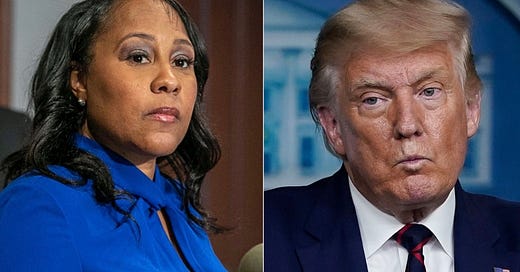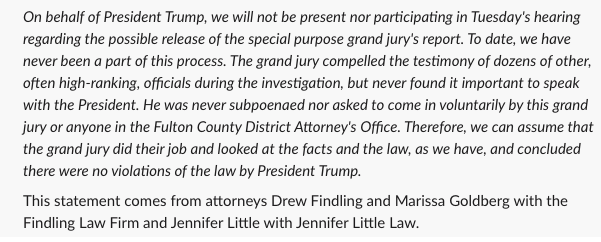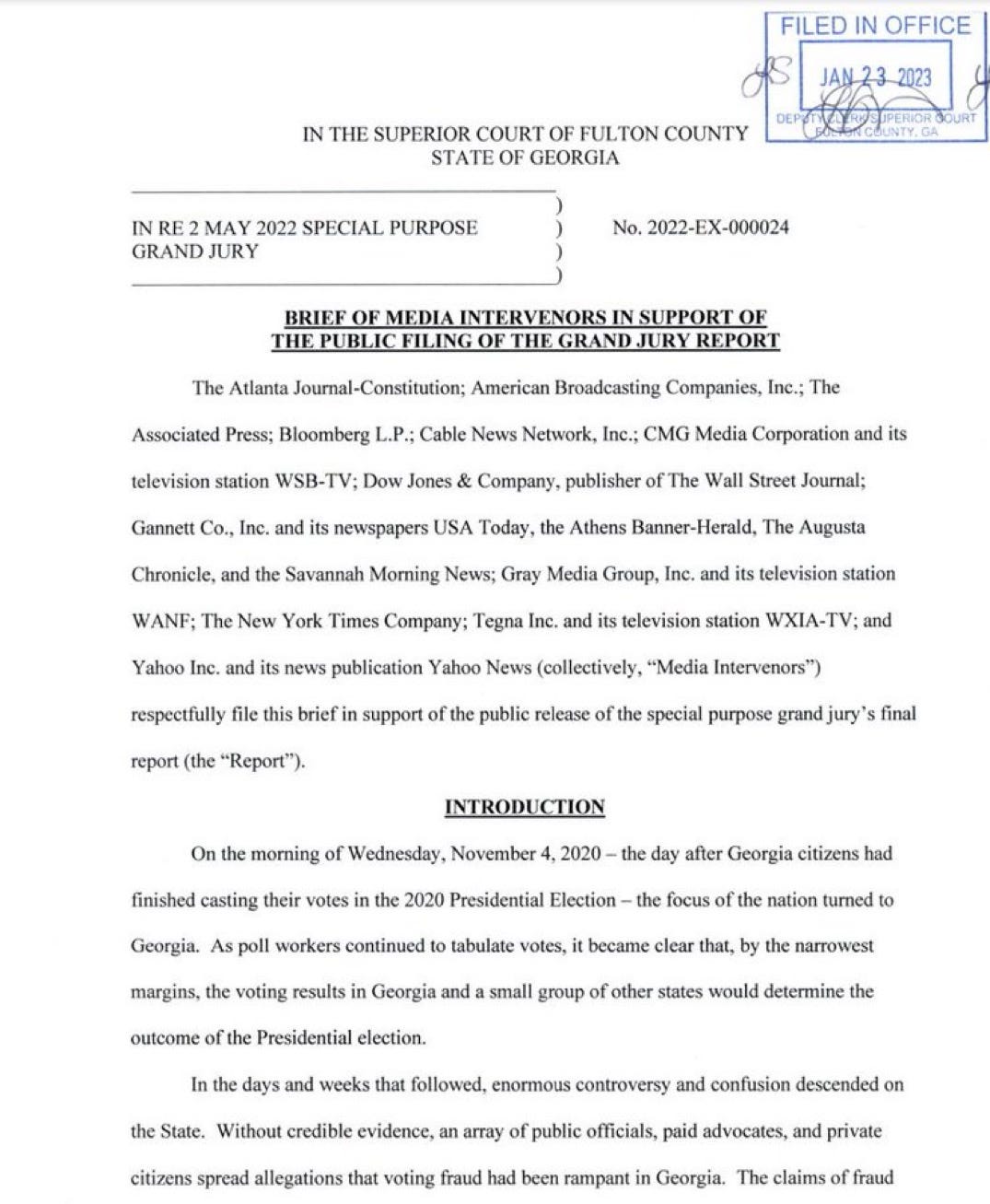Did the Fulton County, Georgia, grand jury recommend that District Attorney Fani Willis bring criminal charges against Donald Trump and some of his cronies?
Today is the day, January 24, when all eyes, or at least those interested in holding the former president accountable for interfering in the 2020 election, will turn to Fulton County. As we’ve discussed previously, Circuit Court Judge Robert McBurney will hold a hearing Tuesday morning to determine whether to make the special grand jury’s report public. That grand jury is known to have been investigating Donald Trump, as well as many others involved in perpetrating the big lie and attempting to interfere with and overturn Georgia’s vote count
.We don’t yet know if District Attorney Willis will seek indictments against Trump or anyone else, but it’s possible that we could get some news tomorrow. It’s equally possible that she is still assessing her case and it will be some time before we know whether she will seek indictments before her regular grand jury. They are, however, in session tomorrow, so the possibility is there.
Meanwhile, Trump’s legal team for the Georgia investigation released a statement Monday, their first so far, saying they would not be present for the hearing and that they’ve never been involved in the process: “We can assume that the grand jury did their job and looked at the facts and the law, as we have, and concluded there were no violations of the law by President Trump.” That’s quite an optimistic leap in reasoning. Personally my experience has been that when grand juries conclude their work, indictments often follow. Still, it’s possible that they’ve been advised of something by the DA’s office. Here’s the full statement:
Typically prosecutors don’t subpoena targets to the grand jury, although they are sometimes invited to testify to see if they’d like to share their side of the story. The federal principles of prosecution define a target as someone who the government has substantial evidence against, linking them to the crime under investigation and who, in the judgment of prosecutors, is very likely to be indicted. That definition, of course, isn’t binding on a county DA in Georgia, and there has been reporting that Willis’s office doesn’t usually send out target letters. But she did here, to 18 individuals, mostly believed to be Georgia Republicans but also including Rudy Giuliani, during her investigation.
Willis also subpoenaed, and in some cases fought in court to get testimony from, Trump’s inner circle, including his chief of staff Mark Meadows, Sen. Lindsey Graham (R-S.C.), his personal lawyer Giuliani, and others who obtained entrée to the White House through Giuliani, including John Eastman, Jenna Ellis, Cleta Mitchell, and Kenneth Chesebro.
A group of national and local media entities have filed a brief in support of releasing the report. We do not see this kind of legal activity from the press as much as we used to—these are leaner times in the media, and litigating is expensive. So filing the brief serves to underscore the national importance of what’s going on in Georgia.
“The public interest in the report is extraordinary,” the motion says. “The court should file the report in the public docket and publish it ... as the special purpose grand jurors have requested.” The parties, which include the Atlanta Journal-Constitution but also the AP, Bloomberg, the New York Times, the Wall Street Journal, USA Today, and many others, as well as television stations, remind the court, which likely needs no reminders at this point, that the special grand jurors requested that the report be released to the public.
As I’ve previously shared, that concerns me a little. It’s difficult to imagine Willis wanting the report, the road map to her case if she has one, made public before she indicts it. Although defendants would ultimately be entitled to much of it, she’d likely want to control the timing and provide discovery on a timeline no more generous than what the rules call for. And there are a lot of possible, but speculative until we see the report, reasons the grand jury asked for the report to be made public: They could be bullish on the case but concerned Willis won’t indict. Or on the contrary, they could have taken the view that Willis sees a case but they don’t believe the evidence is there. Or they could just be believers in transparency, understanding the magnitude of the moment and wanting to share what they’ve learned with fellow citizens. We’ll have to wait and see. But it’s important to remember, nothing at all is certain at this point.
Anna Bower, at Lawfare, has written a great article explaining the precise legal issue the judge will be taking up.


It concerns whether special investigative grand juries function under the same rules that apply to regular grand juries. For regular grand juries, the law says judges “shall” make their presentments public when they make that request, as this special grand jury did. Georgia law is a bit of a mess in this regard, and if you want some background before the judge rules, Anna’s article explains it as well as anyone could. Not only is the law unclear; some of the issues that could be raised here have not been decided before.
So tomorrow is likely to include some tedious legal argument, but there may also be moments of great interest, depending on which lawyers, and possibly subjects and targets of the investigation, show up in court. The judge is likely to give them the opportunity to state their positions as well. It feels a little bit like Christmas Eve, but I’m also prepared for disappointment.
We’re in this together,
Joyce







Thank you Joyce Vance.
I do not know the answer to your question, but I do know Attorney General Fanni Willis has been courageous and resolute in how she has handled this case thus far. Whatever happens, we should support her commendable efforts.
If Trump doesn’t have to work in a Georgia chain gang, I hope at least he has to hoe the onions in 100° temperatures for a few years.